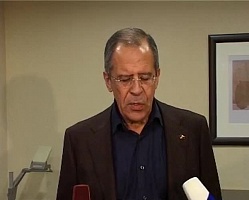Transcript of Response to Questions from Russian Media by Russian Minister of Foreign Affairs Sergey Lavrov Following Talks with FRG Vice Chancellor and Minister of Foreign Affairs Frank-Walter Steinmeier, Dortmund, October 11, 2008
Question: A few days ago Russian President Dmitry Medvedev backed up France's initiative to hold an extraordinary G8 summit to look for solutions to the world economic crisis. Is the date of the meeting known and will Russia come up with any concrete proposals for ways to resolve the situation?
Foreign Minister Lavrov: Firstly, as regards our plans and our ideas, we have no ready-made recipes and do not claim to know answers to all the questions. We have our vision of how to get out of this crisis. It was presented, incidentally, at the G8 summit in Toyako in Japan at the beginning of July. President Medvedev drew attention there to the necessity of collectively addressing the issue of how to avoid upheavals of the world economy and finances, upheavals that had already appeared on the horizon then.
We have now backed up the initiative of President Nicolas Sarkozy. Dmitry Medvedev said about this as he spoke at the conference on world politics in Evian. He stressed that given the global nature of the crisis and the need to prevent it from growing further, it is extremely important that apart from the G8 states the other leading economies should also be present, the Group of Eight's traditional partners in the first place. They are China, India, Brazil, South Africa, Mexico; other participants may also be thought of. By the way, today, during my informal talks with German Foreign Minister Steinmeier I sensed that the German side shares just this approach. We agreed with the necessity of holding a representative forum which would go beyond the "classic G8" and believe that the forum ought to be duly prepared. At the same time, obviously, it's inexpedient to be too slow in convening it. Consultations on the lineup of participants, on the date and on preparatory aspects are beginning one of these days. I think that all the actors will come to some agreement soon.
Question: Could you comment upon the award of the Nobel Peace Prize to Martti Ahtisaari, given our mixed attitude to his plan for resolving the Kosovo problem?
Foreign Minister Lavrov: I cannot comment on the decisions of the Nobel Committee in any detailed way and I only want to say that the Nobel Peace Prize is an award that certainly must be politics-free and must not be politicized.
Moreover, I would like to say that today during the conversation with FRG Vice Chancellor and Minister of Foreign Affairs Frank-Walter Steinmeier we discussed the progress achieved in the implementation of the Medvedev-Sarkozy plan. Germany is interested in seeing that this plan continues to be strictly complied with by all. Germany has made a substantial contribution to forming the corps of European Union observers who are now deployed in the areas adjacent to South Ossetia and Abkhazia. From the German side we feel the understanding of the need to move towards the clear and precise implementation of all the remaining provisions of the Medvedev-Sarkozy plan. This is particularly important in the run-up to the Geneva discussion which is opening on October 15. Our position on this score is well known. We reiterated it to our German colleagues today. It consists in that the discussion, which must be devoted, first and foremost, to the issues of ensuring security in the region, cannot be productive without the full-fledged participation of South Ossetia and Abkhazia. Anyway, as regards Russia, we will be taking part in the formats in which these two republics are represented on a par with all the rest. They are the victims of the attack, and their voice certainly needs to be heeded when we discuss ways to ensure the non-recurrence of this tragedy.
Question: The Europeans are accusing Russia that by not pulling back troops from Akhalgori it has not fully complied with the Medvedev-Sarkozy plan. How could you comment upon this?
Foreign Minister Lavrov: Indeed, as far as I know, some European representatives have expressed regret that Russian peacekeepers have not been pulled out of the Akhalgori district. However this is by no means a violation of the Medvedev-Sarkozy plan because it is written in black and white there that we undertake to withdraw from the areas adjacent to South Ossetia and Abkhazia and that European Union observers are to be introduced into these areas. Akhalgori is within South Ossetia's borders, so this provision of the plan does not apply to it.
October 12, 2008



